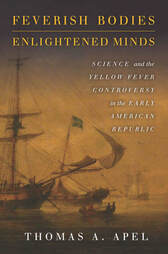|
Jackson Perry Stanford University Press has published Dr. Thomas Apel's first book, Feverish Bodies, Enlightened Minds: Science and the Yellow Fever Controversy in the Early American Republic. Dr. Apel is a professor of history at Menlo College and received his PhD in history from Georgetown University in 2012. Sara Gronim, professor of American history at Long Island University writes of Feverish Bodies, Enlightened Minds: "While competing explanations for the yellow fever epidemics that swept the northeast are the primary subject, Apel persuasively shows how these understandings of disease were infused with theological and political assumptions. Lively and jargon-free, his book should find a wide readership among historians of medicine and of the Early Republic." This month, University Professor John McNeill reflected on the pre-Zika history of mosquito-borne diseases in the Americas in TIME, and on the American peregrinations of the Aedes aegypti mosquito species in AHA Today. The Ottoman History Podcast has published several excellent episodes relevant to environmental history scholars: interviews with Edna Bonhomme on bubonic plague in 18th-century Egypt, Yaron Ayalon on natural disasters in the Ottoman Empire, Alan Mikhail on the Laki eruptions' effects on Ottoman Egypt, and Valentina Pugliano on Venetian physicians who travelled through the early modern Middle East. The early modern cooling period known as the Maunder Minimum appears to have been linked to a significant reduction in Caribbean hurricanes, according to dendrochronological research published in Proceedings of the National Academy of Sciences this month. Overlapping known shipwreck records with tree-ring data series from the Florida Keys, the authors have identified a 75 percent decrease on a decadal scale in Caribbean tropical cyclone activity during the late 17th and early 18th centuries. In "The Unnatural Kingdom," Daniel Duane considers the technology behind the return of bighorn sheep, the Sierra Nevada red fox, and the grey wolf to California. "Undeniably in the service of good, this technological revolution in the human relationship to wildlife is also accelerating the ancient human project of bringing the physical world under our control."
0 Comments
Leave a Reply. |
EH@G BlogArticles written by students and faculty in environmental history at Georgetown University. Archives
May 2020
Categories |


 RSS Feed
RSS Feed